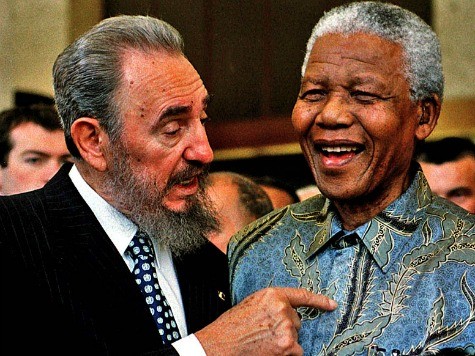
The passing of widely beloved South African icon Nelson Mandela has triggered an outpouring of grief and admiration from millions who benefited from his determination to end a corrupt system. But for the victims of Fidel Castro’s autocracy, which Mandela lavished with praise, such celebration of his life is complicated.
An extraordinary figure, Mandela spent decades in prison for his country to emerge a benevolent leader, a follower of the law. He became an icon of equality before a state too rigid even to begin imagining change, living decades of his life in prison for his beliefs. Once out, he used the democratic process to achieve power–and gave that power to a legitimate successor when he enjoyed a popularity that could have allowed him to get away with not doing so.
Perhaps most importantly, Mandela did not use his power for revenge against those who implemented the apartheid system, setting the precedent that moving on together as a nation required all to live together without killing in the name of those already dead. South Africa has much to be proud of–and much to mourn.
But Nelson Mandela was no saint. He was the exact opposite of a saint–a politician. In the words of Dave Weigel, he was no benign, “muppety” leader for much of his life. South Africans get to choose whether they will forgive Mandela’s involvement in the African National Congress, a terrorist organization. They will choose whether they will sweep under the rug that Mandela believed “that without violence there would be no way open to the African people to succeed in their struggle against the principle of white supremacy.” South Africans alone get to decide how South Africans remember him.
Outside of South Africa, however, Mandela lent his name to a tyrant running his own kind of apartheid system, and the victims and families of Cuban exiles have a duty to their loved ones to speak up before the uncritical eye of the international media.
An avid supporter of Fidel Castro, Mandela visited Havana in 1991 and praised the Cuban Revolution as “a source of inspiration to all freedom-loving people.” Castro responded with praise in kind, as did state-sponsored media for decades to come. “South African and Cuba treasure an inextricable nexus of brotherhood,” gushed the Castro regime’s personal propaganda outlet Granma, “symbolized in the ties of friendship that unite the two exceptional figures in the histories of both nations: Nelson Mandela y Fidel Castro.”
Much is made about the fact that Mandela felt a kinship with Castro over his decision to send up to 10,000 young Cubans to their deaths in Angola. Mandela himself said that few countries could “point to a greater record of selflessness” when describing this purge of Cuban youth. But Mandela did not stop at saying positive things about the regime. He insisted on telling its victims that he was choosing to ignore them.
“Who are they to call for the observance of human rights in Cuba?” he said on his visit there in 1991. “Who are they to teach us about human rights?”
They are the millions, like me, who come from families exiled from their countries because of their beliefs. They are the political prisoners rotting in jail because they believe in social equality, free markets, a solid constitution–the things Mandela gave his people but so callously denied mine. Prisoners who died in captivity, spending even more time there than Mandela himself for opposing Castro’s radical pivot to communism, which he promised his early supporters he would never turn to; prisoners who personally pleaded for Mandela to speak up for them, to fight with them for freedom.
He may have fought for the freedom of oppressed South Africans, but he did not fight for the freedom or equality of my people; instead he actively supported their oppression. By visiting Fidel Castro and praising the revolution, Mandela lent his grand name and hard-earned reputation to the cause of a brutal mass murderer who imprisoned thousands for their politics, forced one million to flee their tiny homeland for the same, and continues to oppress people who have been torn apart family by family, barely recognizing each other across a 90-mile gap.
It is difficult to mourn Mandela uncritically when his answer to the firing squads, the purges, the labor camps both my grandparents spent three years working under to flee to Spain was, essentially, “Who are you for me to care?” If Mandela himself so demonstratively refused to care about the plight of those who are my blood, perhaps he would understand why it takes a Herculean effort to care about his.
That is not to say that Mandela’s fight against apartheid was not noble or that apartheid was not the distinctive evil we recognize it for today. One can believe both that a South Africa under Mandela was better than the alternative and that Mandela outside of South Africa colluded with some leaders whose manner of governing their state was no better than the apartheid system. Both these beliefs can coexist because Mandela was a complicated figure and a human being who got things wrong. And those mourning cannot expect the victims of his mistakes to betray their families by remaining quiet.

COMMENTS
Please let us know if you're having issues with commenting.